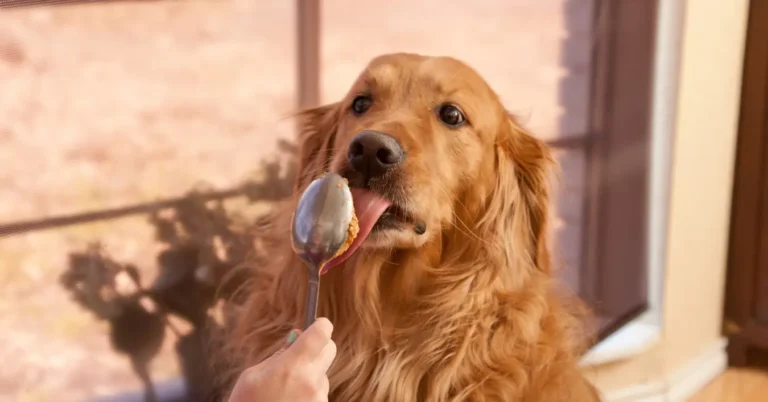Can dogs eat peanut butter? Peanuts are high in calcium, magnesium, copper, iron, and zinc; nevertheless, be careful with certain peanut butter brands that include a chemical called xylitol, which is toxic to dogs, and even ingesting small amounts can be fatal. Xylitol is an artificial sweetener that’s often used in meals to make the product sugar-free.
If you give your dog peanuts, make sure to examine the label first and avoid giving them anything with xylitol on it if it’s mentioned in the ingredients list. Contact your veterinarian as soon as possible if your dog ingests something that includes xylitol.
The amount of peanut butter that dogs can eat varies based on their size, breed, and age. Like all treats, peanut butter should be used in moderation and fed as part of a balanced diet.
Is Peanut Butter Okay For Dogs?
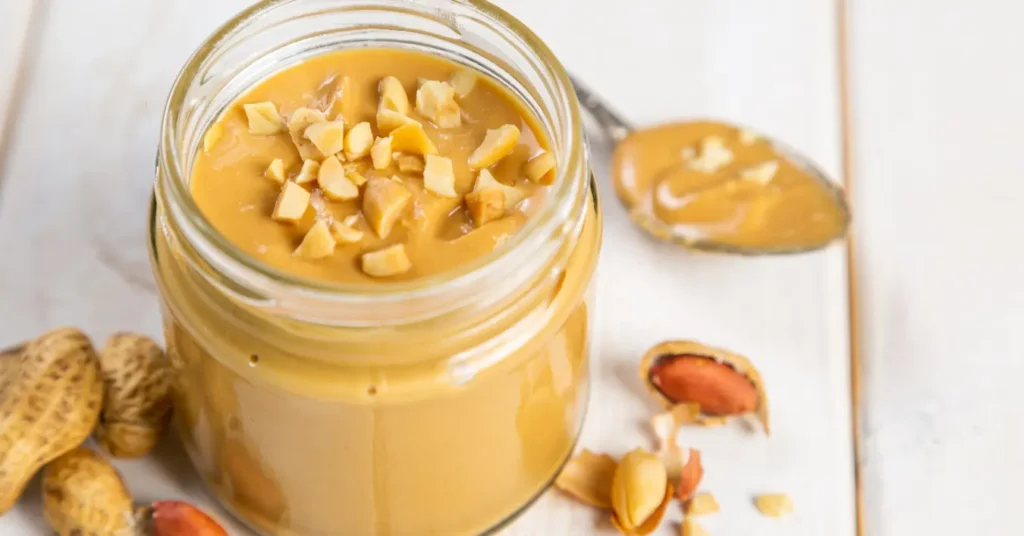
There are a lot of conflicting opinions out there about whether or not peanut butter is safe for dogs. Some people say that it’s perfectly fine, while others claim that it can be dangerous. So, what’s the truth? Well, the answer isn’t entirely clear. Peanut butter does contain a substance called xylitol, which is toxic to dogs. However, most brands of peanut butter don’t actually use enough xylitol to be harmful.
That said, it’s always best to err on the side of caution. If you’re going to give your dog peanut butter, make sure to choose a brand that doesn’t contain xylitol. You should also avoid giving them too much, as this could potentially cause an upset stomach. So, while peanut butter isn’t necessarily harmful to dogs, it’s best to give it to them in moderation.
While we might think of our dogs as small humans, the reality is that animal nutrition differs from human nutrition. Case in point: Xylitol, a sugar substitute commonly found in human-friendly products, including some peanut butters. Xylitol is downright toxic for dogs and cats, with documented cases of toxicity. So, when it comes to treating your furry friend, steer clear of Xylitol-laden peanut butter.
How Much Peanut Butter Is Safe For My Dog?
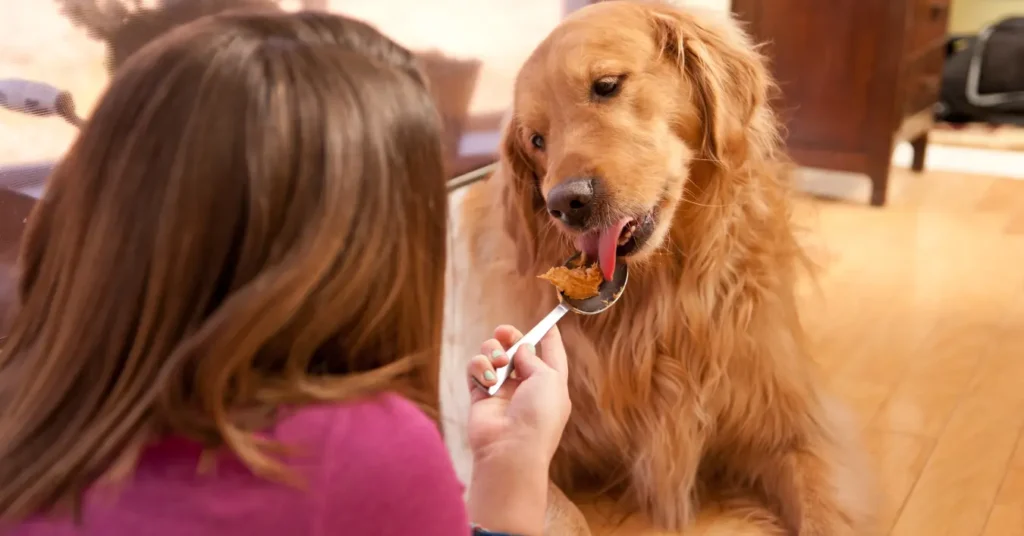
It’s a common question and one that doesn’t have a straightforward answer. The amount of peanut butter that is safe for your dog to eat depends on a number of factors, including their size, weight, and overall health. In general, small dogs can safely consume about 1 tablespoon of peanut butter per day, while larger dogs can have up to 2 tablespoons. However, it’s always best to check with your veterinarian before giving your dog any new food, just to be sure.
To determine the right amount for your furry friend, consider two practical options. Firstly, seek guidance from your veterinarian, especially if your dog has conditions like diabetes or food sensitivities. Their professional advice is invaluable in tailoring the appropriate peanut butter intake.
Alternatively, follow the 10 percent rule for treats in your dog’s diet. Limit peanut butter and other treats to no more than 10 percent of your dog’s daily food intake. Measure their daily food portion, and consider incorporating healthier alternatives like dog-friendly fruits or vegetables into the mix.
Strike a balance to ensure your dog enjoys the goodness of peanut butter without compromising their well-being.
Peanut Butter Is Protein And Healthy Fats

Peanut butter is a good source of protein and healthy fats for dogs and can be used as a training treat or an occasional snack. Just be sure to choose a brand that does not contain sugar or salt, as these can be harmful to dogs. Also, avoid giving your dog peanut butter that contains xylitol, as this is a sugar substitute that can be toxic to dogs.
Peanut butter with added salt, sugars, and oils alters its nutritional composition. For instance, a salt-infused peanut butter can contain 100 to 150 milligrams of sodium, while the unsalted version is sodium-free. Keep an eye out for sugars, especially in flavored varieties, as they can contribute up to 7 grams or 28 calories per serving. Ensuring your dog enjoys peanut butter in its purest form guarantees a tasty and nutritious treat.
Peanut butter offers heart-healthy fats and packs a protein punch, making it a wholesome addition to your dog’s diet. A two-tablespoon serving delivers around 8 grams of protein and 2 to 3 grams of fiber, offering a nutritious boost for your canine companion. Additionally, peanut butter provides essential vitamins and minerals such as niacin, iron, potassium, and vitamin E.
If you do decide to give your dog peanut butter, always supervise them while they are eating it, and make sure they have plenty of fresh water available. And, of course, always clean up any messes promptly to prevent your dog from getting into the peanut butter when you’re not looking!
Nutritional Value Of Peanut Butter
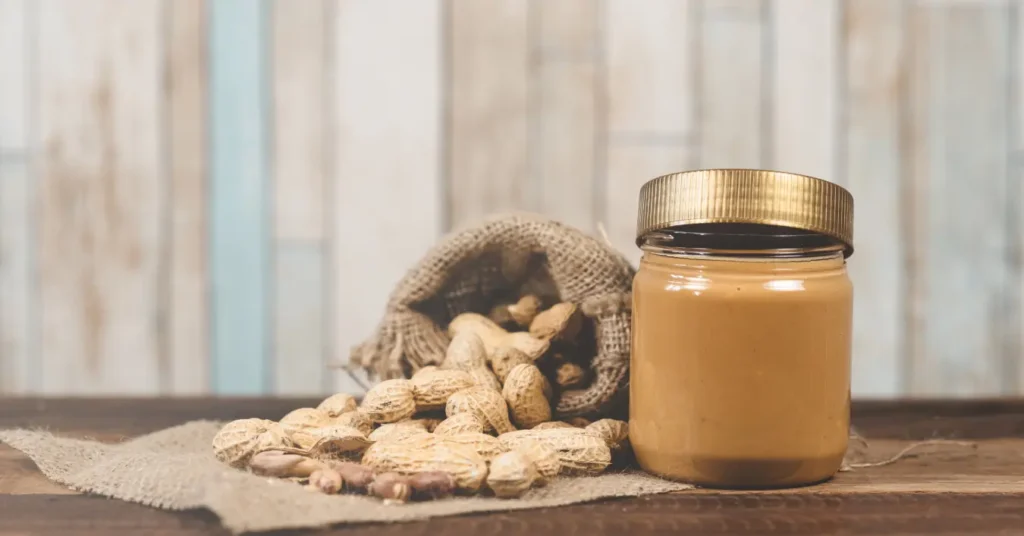
Peanut butter is a popular food made from peanuts. It is rich in nutrients and has a variety of health benefits. Peanut butter is a good source of protein. It also contains healthy fats, vitamins, and minerals. Peanut butter can be a tasty and nutritious treat for dogs when incorporated into their diet with care. While it provides essential nutrients and healthy fats, responsible pet ownership involves understanding a dog’s specific dietary needs and potential sensitivities.
| Nutrient | Amount per 3.5 oz (100g) |
|---|---|
| Carbohydrates | 22 grams (14% of calories) |
| Protein | 22.5 grams (14% of calories) |
| Fat | 51 grams (72% of calories) |
| Vitamin E | 60% of Daily Value (DV) |
| Vitamin B3 (Niacin) | 84% of DV |
| Vitamin B6 | 29% of DV |
| Folate | 18% of DV |
| Magnesium | 37% of DV |
| Copper | 56% of DV |
| Manganese | 65% of DV |
Canine Macronutrient Balance
Peanut butter is a dog-friendly treat, offering approximately 22 grams of carbohydrates, 22.5 grams of protein, and 51 grams of fat in a 3.5-ounce serving. While it’s a decent source of energy, it’s important to supplement a dog’s diet with other nutrients, ensuring a well-rounded intake for their unique dietary requirements.
Low Carbohydrate Content and Blood Sugar Impact
Pure peanut butter remains a low-carb option, suitable for dogs that may benefit from a reduced carbohydrate intake. Its minimal impact on blood sugar makes it a safe choice for canines, and its palatable nature can make it an enjoyable addition to their diet. Always ensure that the peanut butter does not contain added sugars, which can be harmful to dogs.
Healthy Fats and Potential Concerns
The high-fat content in peanut butter can provide a source of healthy fats for dogs. With its inclusion of heart-healthy fats like oleic acid, peanut butter can contribute positively to a dog’s overall health. However, moderation is key, as excessive fat intake may lead to digestive issues in some dogs.
Nutrient Profile and Caloric Considerations
Peanut butter offers dogs various essential nutrients, including Vitamin E, Vitamin B3, Vitamin B6, folate, magnesium, copper, and manganese. While it adds nutritional value to their diet, pet owners should be mindful of portion sizes due to its calorie density. Adjust the serving based on the dog’s size and daily caloric requirements.
Aflatoxin Concerns and Safety Measures
When choosing peanut butter for dogs, opt for varieties without artificial sweeteners, xylitol, or added sugars, as these can be toxic to dogs. Additionally, consider potential aflatoxin risks, as unprocessed peanut butter may contain traces of this substance. Stick to reputable commercial brands and examine the product for any signs of mold or discoloration.
Risks Of Peanut Butter For Dogs
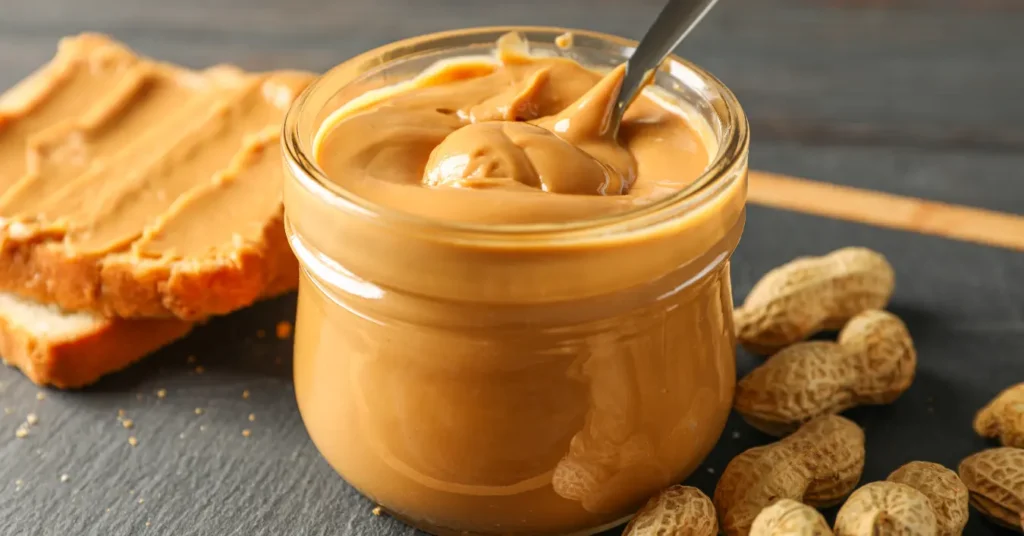
Not all dogs should indulge in peanut butter, especially those watching their waistlines. If your furry friend is on a diet or should be, it’s wise to choose leaner alternatives for training treats. Opt for chicken, ham, or tuna to keep their calorie intake in check.
For dogs with kidney problems, caution is advised when offering peanut butter. This beloved spread often contains a high salt content, making it unsuitable for canines dealing with kidney issues. To prioritize their health, it’s best to explore low-sodium options or consult with your veterinarian for suitable alternatives.
When it comes to dogs on special diets or with food sensitivities, consistency is key. Deviating from their prescribed meals can disrupt their nutritional balance. If your dog has specific dietary requirements to stay healthy, it’s recommended to stick to their regular food and avoid introducing peanut butter or any new treats without consulting your vet.
Xylitol is often used as an artificial sweetener to maintain sugar-free products. Prioritize your pet’s well-being by diligently examining the peanut butter label for the presence of xylitol before sharing it with them. If your dog happens to ingest any xylitol-containing product, swift action is necessary – contact your vet immediately and communicate the details of your pet’s consumption.
How To Safely Feed Your Dog Peanut Butter

Peanut butter is a popular food for dogs, and for good reason. It’s packed with protein and healthy fats, and it’s a delicious treat that most dogs love.
However, there are a few things you need to keep in mind when feeding your dog peanut butter.
1. Choose The Right Peanut Butter
The first thing you need to do is choose the right peanut butter. Not all peanut butter is created equal, and some can actually be dangerous for dogs. Many brands of peanut butter contain xylitol, which is a sugar substitute that is toxic to dogs. Even a small amount of xylitol can cause low blood sugar, seizures, and even liver failure in dogs. So, make sure you check the label of any peanut butter you’re considering giving to your dog and avoid any that contain xylitol.
2. Go Natural
Another thing to look for in peanut butter is that it is natural. Many commercially-produced peanut butters contain additives and preservatives that are not good for dogs. So, make sure to choose a peanut butter that is made with only peanuts and nothing else. This will be the safest and most healthy option for your dog.
3. Avoid Salt And Sugar
Salt and sugar are two other things you want to avoid when feeding your dog peanut butter. Too much salt can be dangerous for dogs and can cause problems like dehydration and electrolyte imbalances. And while sugar is not necessarily harmful to dogs, it’s best to avoid it if possible since it can lead to weight gain and other health problems.
4. Give In moderation
As with anything, moderation is key when feeding your dog peanut butter. Peanut butter is high in calories and fat, so giving too much can lead to weight gain. So, start with a small amount and see how your dog does. You can always give more if needed, but it’s best to err on the side of caution.
Follow these tips and you can safely feed your dog peanut butter as a healthy treat. Just make sure to choose the right kind of peanut butter and avoid giving too much.
Conclusion | Can Dogs Eat Peanut Butter?
Peanut butter is a safe and healthy snack for dogs when given in moderation. However, there are some things to watch out for, such as xylitol which is toxic to dogs, salt and sugar which can be dangerous in high amounts, and additives and preservatives which are not good for dogs.
While dogs often relish peanut butter, it’s crucial to note the potential danger of xylitol in certain brands. Xylitol, an artificial sweetener used to maintain sugar-free products, can be toxic to dogs even in small quantities. Always check peanut butter labels for xylitol to ensure your pet’s safety.
So, make sure you choose a peanut butter that is made with only peanuts and nothing else, avoid giving too much and start with a small amount to see how your dog does. With these tips, you can safely feed your dog peanut butter as a healthy and delicious treat. Thanks for Reading!
Can Dogs Eat Peanut Butter? FAQs
You Might Also Like:
